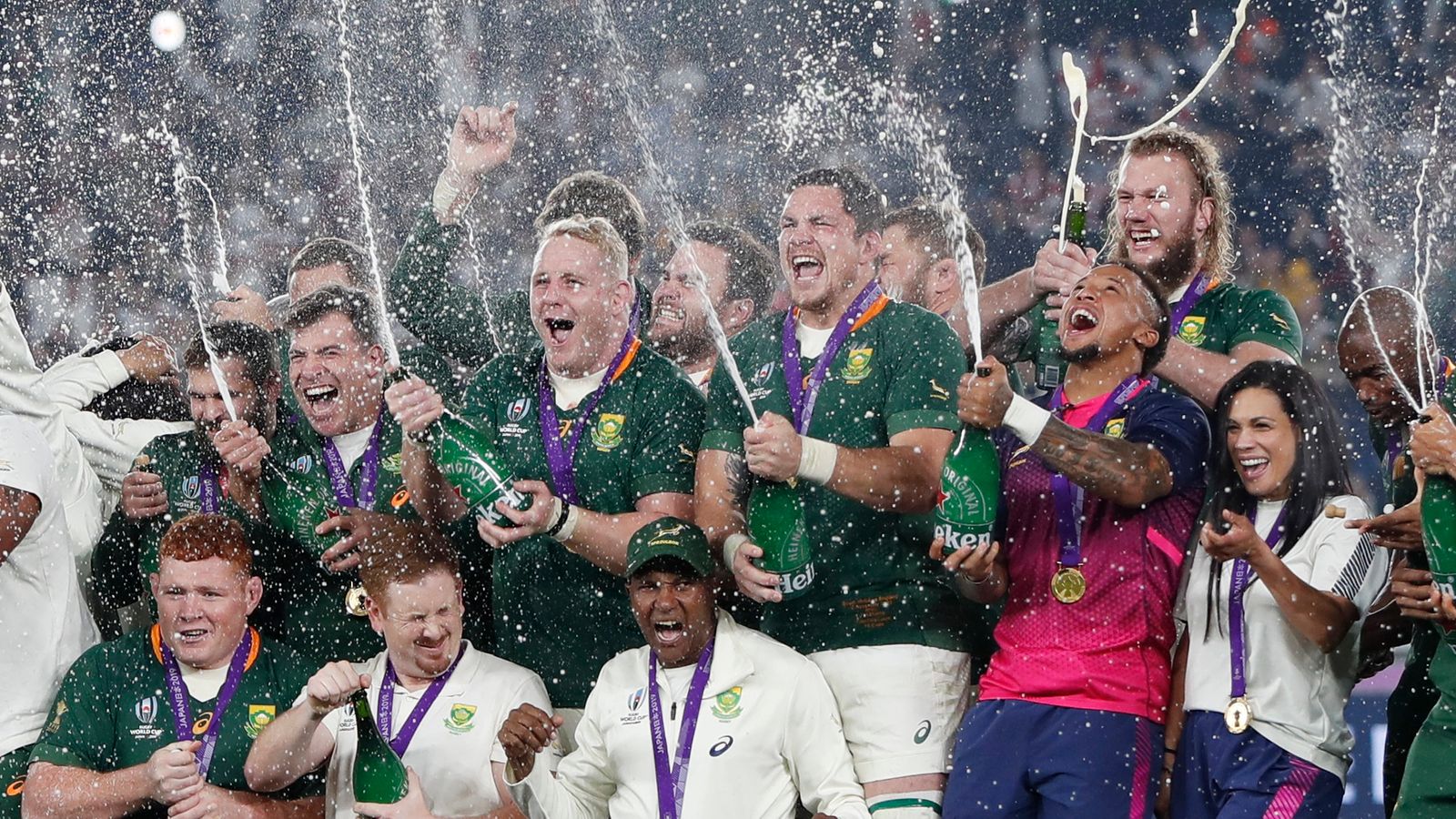Rugby union’s global governing body is lining up investment bankers to explore proposals for new financial and media partnerships that will accelerate a seismic commercial shake-up of one of the world’s most popular sports.
Sky News has learnt that World Rugby has shortlisted three banks to advise it on options that are expected to include soliciting investment in the quadrennial Rugby World Cup, the men’s version of which was won last year by South Africa.
City sources said on Monday that Barclays, Jefferies and Rothschild were among the banks which had pitched for the role as adviser to World Rugby.
Lord Davies of Abersoch, the former Standard Chartered chairman and one-time UK trade minister, is understood to be playing a key role in the strategic review in his capacity as a World Rugby independent non-executive director.
Board members are said to have met to discuss the appointment of bankers last week.
The review is at an early stage, but insiders said that World Rugby – chaired by the former England captain, Sir Bill Beaumont – had made it clear that no options were off the table after a year in which the sport’s finances have been decimated by the pandemic.
The governing body also owns the rights to international Sevens rugby, the world series of which is sponsored by HSBC.
One source said the sale of an equity stake in a new commercial entity which held the commercial rights to the Men’s and Women’s Rugby World Cups was unlikely to be the governing body’s preferred choice.
Nevertheless, that idea is expected to draw significant interest from buyout firms, particularly those with an existing interest in the sport.
Please use Chrome browser for a more accessible video player
World Rugby is also likely to examine some form of structured debt deal or media partnerships with external backers.
News of the imminent appointment of bankers comes days after CVC Capital Partners concluded a £365m investment that gives it a one-seventh stake in the Six Nations Championship.
The deal adds to CVC’s interests in elite rugby union, following its acquisition of stakes in Premiership Rugby and Pro14Rugby.
Its next target is an interest in the sport in South Africa, which The Times reported last week had led to exclusive discussions about an agreement.
If CVC completes the South African deal, it will preside over stakes in the commercial interests of seven of the world’s most important rugby union-playing countries.
CVC is expected to be a leading contender to invest in any World Rugby properties that become open to third-party investment, according to people close to the sport.
Another likely candidate is Silver Lake, the US-based private equity firm which – as Sky News revealed earlier this year – is in detailed talks to buy a 15% stake in the New Zealand All Blacks’ commercial rights.
CVC is understood to have bid against Silver Lake during the All Blacks process, which has yet to be formally confirmed.
The sport’s governing body in Australia is reported to be pursuing similar discussions with private equity firms.
World Rugby’s finances have been comparatively unaffected by the COVID-19 crisis so far, because its most important money-spinner – the men’s World Cup – concluded just a few months before governments began to impose national lockdowns on their populations.
The tournament generates 90% of World Rugby’s revenue, and net profits from the last event in Japan were reported to be £350m.
The next World Cup will take place in France in 2023, and executives are keen to identify a blueprint for commercial reform before then.
On Monday, World Rugby announced that the first tickets for the tournament were going on sale, with a record 2.6m being made available.
One of the priorities for any new media or investment partnerships is likely to be the unification of the northern and southern hemisphere rugby calendars in order to maximise their earning potential, according to insiders.
The process to explore new funding options comes nearly two years after World Rugby called off talks about a £6.1bn, 12-year deal to create a global Nations Championship.
The project was abandoned after it failed to secure the unanimous backing of unions.
As with other pandemic-affected sports, however, there is likely to be renewed recognition of the need to explore new commercial routes to help repair the finances of national unions.
During the last year, World Rugby says it has invested more than $100m in providing relief to COVID-affected members, of which it has 128 in total.
The governing body is also forecast to invest £565m in competitions, player welfare initiatives and national member unions over the 2020-23 period – a 22% increase on the prior four-year cycle.
It attributes the larger sum to the success of Japan 2019 and ring-fenced revenue guarantees from the 2023 tournament, which has seen the official travel and hospitality rights sold to the organising committee for the first time.
A World Rugby spokesperson told Sky News: “World Rugby continues to keep an open mind in exploring all opportunities to invest in the growth of the sport for the global rugby family and routinely engages with expertise to evaluate such opportunities.
“It would be inappropriate to comment on any exploratory and confidential conversations.”






















